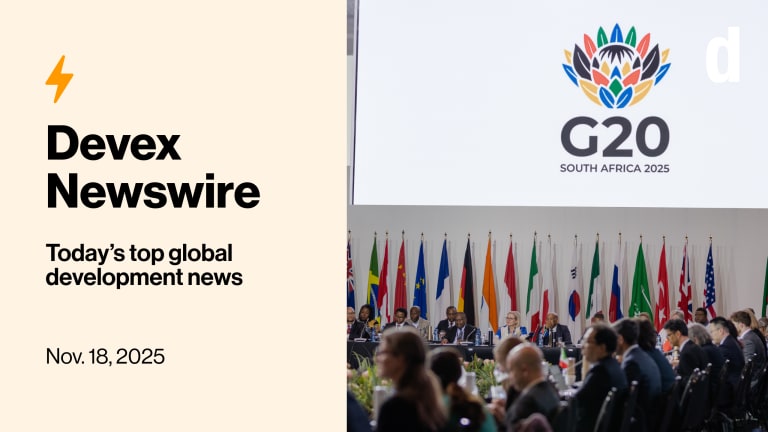
The World Health Organization failed to report allegations of sexual abuse and was “completely unprepared” to deal with the risks of exploitation during its 2018-2020 response to the Ebola outbreak in the Democratic Republic of Congo, according to a damning report released Tuesday.
An investigation by the New Humanitarian and the Thomson Reuters Foundation in September 2020 documented accusations by more than 50 women of sexual exploitation and abuse against Ebola aid workers, including some who worked for WHO.
This is a preview of Newswire
Sign up to this newsletter for an inside look at the biggest stories in global development, in your inbox daily.
In response, the organization formed an independent commission to “establish the facts and underlying circumstances” of the allegations.
The commission — co-chaired by Aïchatou Mindaoudou, who was formerly Niger’s foreign affairs minister, and Congolese human rights activist Julienne Lusenge — identified 83 people accused of sexual abuse during the Ebola response, including at least 21 WHO doctors, consultants, and senior staffers, Jenny Lei Ravelo reports.
The report documents some of the incidents. The youngest of the accusers the commission interviewed said she was selling phone recharge cards by the side of the road when a WHO driver stopped to offer her a ride home. Instead, she told the interviewers, he took her to a hotel and raped her.
The report points to a “total absence of reports of sexual exploitation and abuse at the institutional level during the reporting period.” It says that women — who account for most of the alleged victims — have been “left to deal with the physical and moral consequences of the sexual exploitation and abuse they have suffered.”
“As the director-general, I take ultimate responsibility for the behavior of the people we employ and for any failings in our systems that allowed this behavior,” WHO Director-General Tedros Adhanom Ghebreyesus said at a press conference Tuesday.
Read: Tedros apologizes as report details WHO sex abuse in DRC Ebola crisis
Changing lanes
Now, DRC faces another deadly outbreak. The country has seen 940 suspected cases and 174 deaths from meningitis since an outbreak was declared earlier this month.
Globally, progress on reducing meningitis has been slower than for other vaccine-preventable diseases, according to WHO. Outbreaks tend to occur in overcrowded areas and often accompany conflict or disaster-related displacement.
Sara Jerving reports that WHO has launched its first global road map to defeat the disease by 2030.
Read: Progress on vaccinating against meningitis is too slow, says WHO
+ For more content like this, sign up for Devex CheckUp, the must-read weekly newsletter for exclusive global health news and insider insights.
Cold shoulder
In the wake of an investigation that found she pressured staff to manipulate country rankings, IMF chief Kristalina Georgieva’s support from key United States government allies could be under strain. Bloomberg reported this week that U.S. Treasury Secretary Janet Yellen has declined to take Georgieva’s phone calls, while two U.S. senators called on Yellen to ensure “full accountability” for the allegations.
Georgieva continues to dispute the independent investigation’s findings related to her role in changes to the Doing Business report.
Think tank Center for Strategic and International Studies issued a new report Tuesday on U.S. leadership in multilateral institutions. It finds that “the United States’ ability to compete in leadership races and place qualified representatives in top positions has diminished, and the presence of qualified Americans in staff positions has also declined.”
ICYMI: World Bank scraps Doing Business rankings due to data irregularities
Answering the call
“At the end of this year, I’m sure that many more people will have died in Africa because of HIV/AIDS than COVID-19.”
— Dr. John Nkengasong, head, Africa Centres for Disease Control and PreventionOn Monday, the Biden administration officially announced it is nominating Dr. John Nkengasong to be the next U.S. global AIDS coordinator and head of The U.S. President's Emergency Plan for AIDS Relief. Sara asks Nkengasong how he’s feeling about the nomination.
Read: Africa CDC head 'honored' by Biden's intent for PEPFAR nomination
COP out
Logistics concerns continue to plague COP 26 — scheduled for Glasglow in November — and civil society groups are concerned that there will be less space for their delegations than usual, according to Climate Action Network Director Catherine Pettengell.
And that’s not the only negative news for the battered U.K. aid sector. My colleague Will Worley reports that multiple recently published papers from development economists are warning of a potential third round of aid cuts that could further hamper NGOs and aid programs.
Read: Civil society fears COP 26 exclusion
Learn more: UK aid budget could face third round of cuts, experts warn
+ Will and Raquel Alcega have analyzed the data and found: Cuts to the U.K’s aid budget will hit lower-income and fragile countries harder than middle-income nations. Read their full report.
Pro subscribers can also read Will’s reckoning of the Foreign, Commonwealth & Development Office first year that asks the important question: What has it achieved? FCDO controls the majority of the U.K.’s official development assistance. Not yet a Pro subscriber? Sign up now and start your 15-day free trial.
In other news
Chinese aid to the Pacific region has dropped by 31% to $169 million in 2019, according to an Australian think tank. [ABC News]
More than 2 million people in Kenya are at risk of food insecurity following months of droughts in some parts of the country. [IRC]
Research into China's Belt and Road Initiative has revealed that many lower-income countries are weighted down with underreported debts amounting to $385 billion. [France 24]
Sign up to Newswire for an inside look at the biggest stories in global development.
Search for articles
Most Read
- 1
- 2
- 3
- 4
- 5








